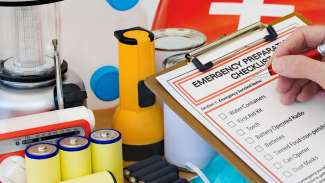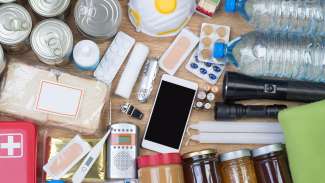There are three ways to use this page.
- You can print this webpage and fill in the information or check off your list.
- You can have this page open on your computer or phone and check off the list.
- You can download and/or print the entire Ready Raleigh Guide and Workbook.
Utility Companies
Keep track of important utility contacts in a chart like this:
| Name | Phone Number | Service |
| example: Duke Energy Progress |
example: 800-452-2777 |
example: report fallen power lines |
| your electric company | ||
| your cable company | ||
| your phone company | ||
| your gas company | ||
| others? |
Make a plan
Planning for emergencies will help ensure everyone in your household will know what to expect and what to do in case a disaster strikes.
Document your plan and keep a copy of it in your emergency kit. Templates for family disaster plans can be found at
Build a kit
Keeping an emergency preparedness kit in your home can help your household be ready for a variety of emergencies. An emergency kit should provide supplies for your household for three days without power. The kit should be kept in a sturdy bag. Rethink your needs every year and update your kit as your family’s needs change.
For more information on building an emergency kit go to:
www.ready.gov/kit
Additional emergency supplies
- __ Necessary prescription medications
- __ Non-prescription medications such as pain relievers, anti-diarrhea medication, antacids or laxatives
- __ Glasses and contact lens solution
- __ Infant formula, bottles, diapers, wipes, diaper rash cream
- __ Pet food and extra water for your pet
- __ Sleeping bag or warm blanket for each person
- __ Change of clothing appropriate for your climate and sturdy shoes
- __ Household chlorine bleach and medicine dropper to disinfect water
- __ Fire extinguisher
- __ Personal hygiene items such as soap, toothpaste, sanitary napkins, etc
- __ Mess kits, paper cups, plates, paper towels and plastic utensils
- __ Paper and pencil
- __ Books, games, puzzles or other activities for children
Documents
It is also a good idea to keep copies of important documents in your emergency kit. Keeping them handy will ensure they stay with you in case you need to evacuate your home. Additionally, saving digital copies in a secure and password-protected cloud server or other secure location will ensure you can access them in case items in your home are damaged or destroyed.
- __ Copies of identification
- __ Driver’s licenses
- __ Birth certificates
- __ Passport
- __ Social security cards
- __ Copies of insurance policies
- __ Renters/homeowners insurance
- __ Medical/dental/prescription insurance cards
- Financial statements and bank account records (contact information, account numbers and online login information)
- __ Mortgage records
- __ Car loans
- __ Retirement accounts
- __ Utility accounts
- __ Credit cards
- __ Brokerage firms
- __ Student and other loans
- __ Legal documents
- __ Car registration and title
- __ Property deeds
- __ Wills
- __ Health-care proxy and/or power of attorney
- __ Home inventory including receipts or appraisals for major purchase
- __ Cash or traveler’s check
- __ Utility account information
- __ Account numbers and online login information


